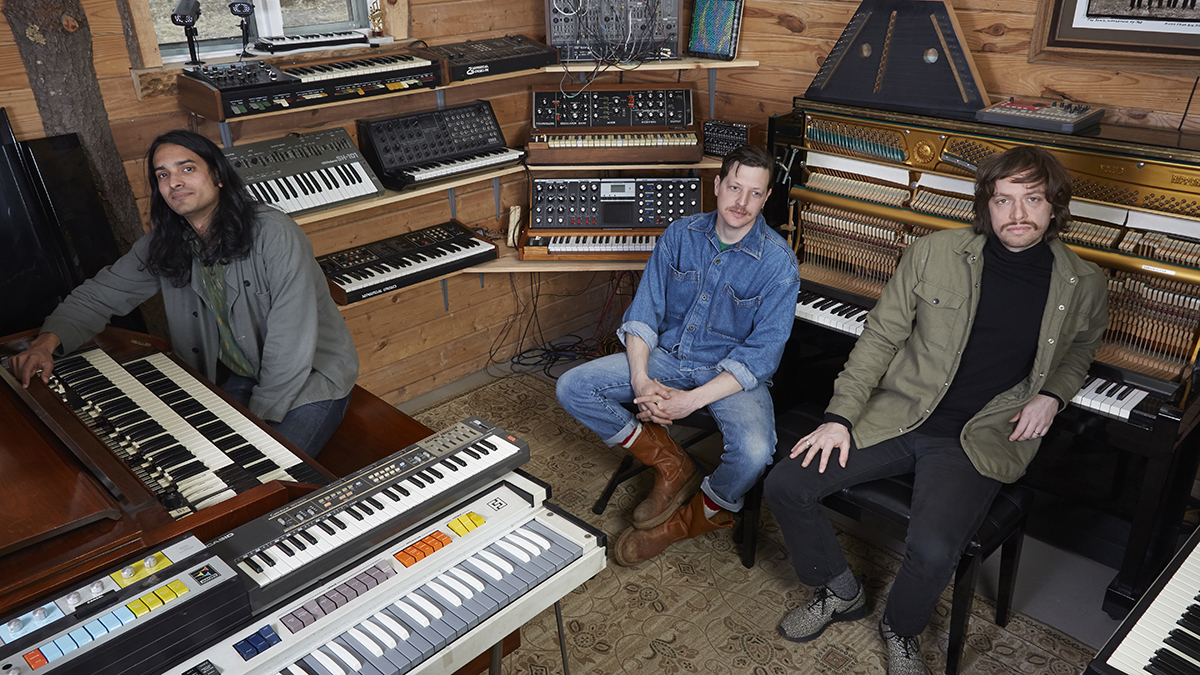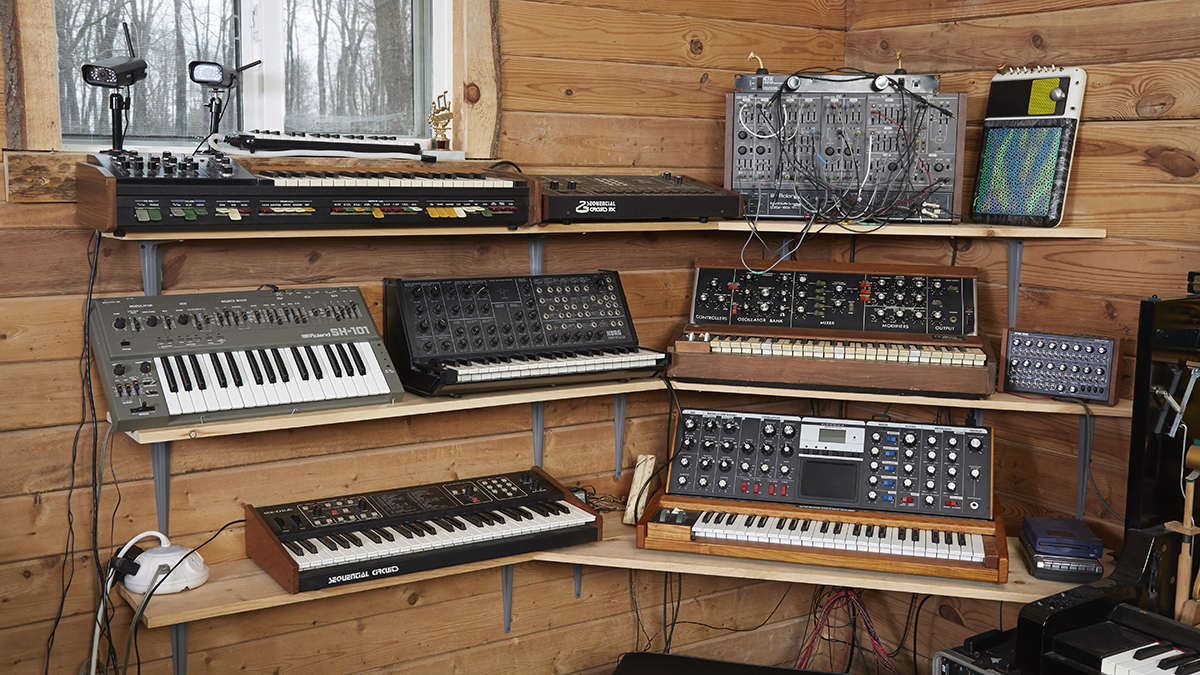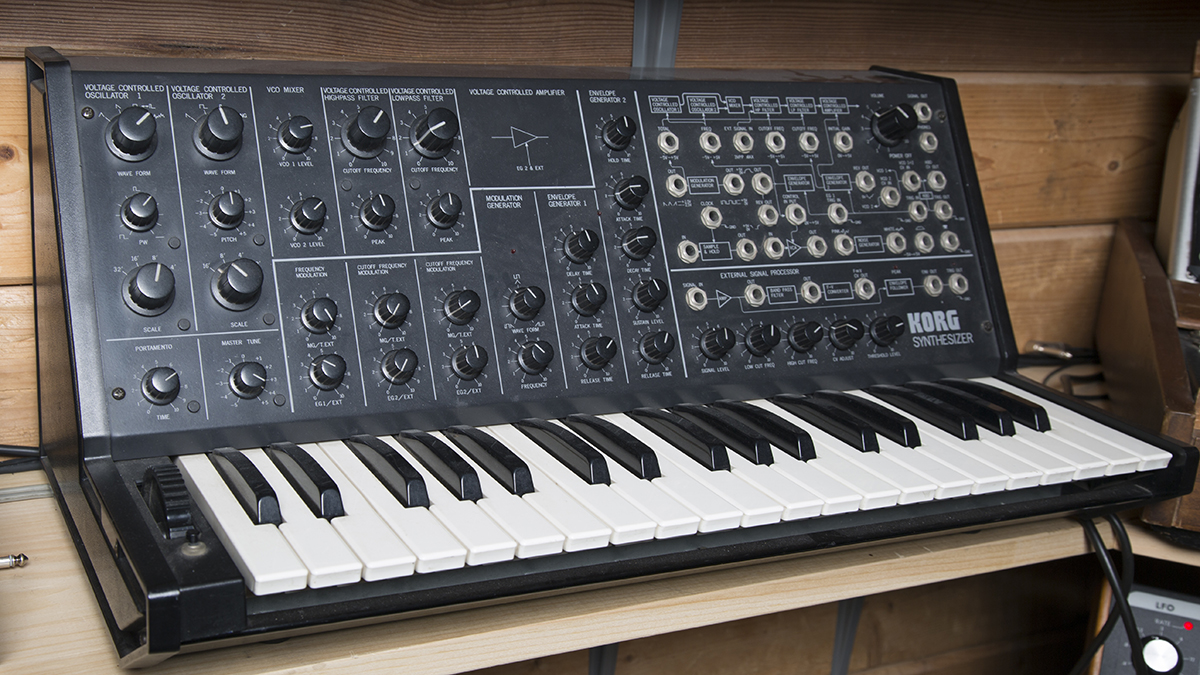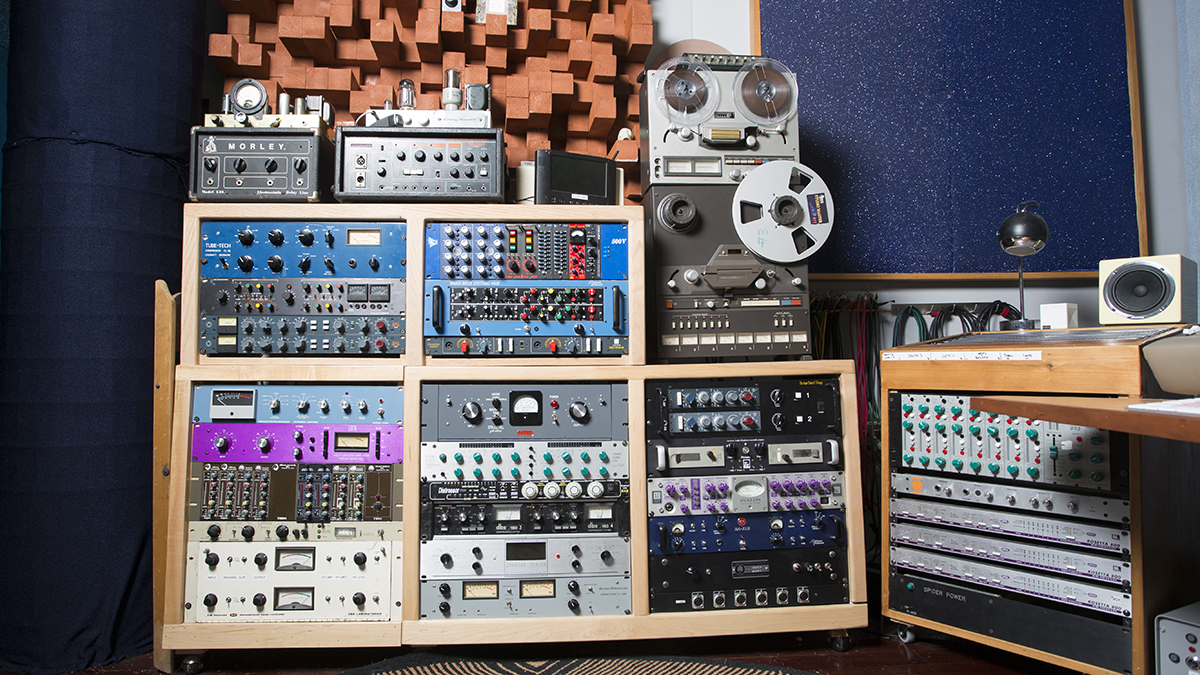Yeasayer geek-out in the gear department and talk new album Amen & Goodbye
Artrock vanguards invite us to a discrete location in upstate New York for a chat

Yeasayer first came to the public's attention at the Texas-based South by Southwest festival in 2007. Comprising Chris Keating, Ira Wolf Tuton and Anand Wilder, the trio describe their sound as "Middle Eastern-psych- snap-gospel", which does little to clarify their assimilated influences or accurately describe their wildly eclectic use of syncopated instrumentation.
For most bands, having two songwriters would cause untenable friction, but for Yeasayer friction is the wellspring of their creativity. Their fourth album, Amen & Goodbye, is another exercise in deconstruction and experimentation, enabling the group to perfect the art of making technology sound acoustic and acoustics sound electronic. The album, recorded in rural upstate New York, took the band away from their home comforts, and had them wrangling with chickens, goats and thunderbolts.
Are you used to no longer being the new kids on the block?
Chris Keating: "Yeah, we're like a legacy band now [laughs]. We're going to start playing state fairs. On our first record we were trying to respond to what we were hearing, felt we should do and how we could make something that would sound unique. I think we try to do that every time. It's like, damn let's just try to make something cool and different to what we've done or what other people are doing."
Has being on the road a lot affected the time you can allot to making music?
Ira Wolf Tuton: "Pretty much I guess. The only other way to make money is by publishing or selling yourself to commercials. Once that comes to a band, other companies will use that same song over and over again, but we haven't had to negotiate our conscience on that one yet."
CK: "We're trying to get a little pot from all of these things - touring, records - a media pot. I'd like to think of it in a positive way. Touring is a good, natural barrier to have between projects so that you can develop a fresh approach. You have the ability to reset and recalibrate when you have these chunks of time that are totally distant from actively writing.
Want all the hottest music and gear news, reviews, deals, features and more, direct to your inbox? Sign up here.
"You also get to see other bands and what they're doing, but at the same time it's hard to jump back into the headspace of creativity after being on the road so much as it's such a myopic thing to do."
Has your approach to writing and recording changed over the past decade?
IWT: "It seems to have changed a lot, but we still don't know what we're doing. We're always trying to figure it out and do something new, and stay current with technology too. I still get excited when I read about a new piece of gear, trying to learn it. I think engaging with new technology is important to creating music."
CK: "When I started recording demos with Yeasayer I was doing it on a four-track, so through the space of this band I've learned how to use a computer and that interface completely changes the way you approach editing."
Anand Wilder: "On this last record, you can see the different interfaces that all these pieces of gear have, beyond whether you relate to Logic or Ableton. Chris used the Dave Smith Tempest a lot on the record, which has a very specific interface as opposed to the Nord Drum Machine or other programmable devices, so we've had to recalibrate our brains to using different technology with every record. Every album should have a character."
IWT: "One thing that's been consistent throughout the four records is using different recording devices to capture sounds and throwing them all together to give it more dimension and more dynamic."
How do you feel the new album Amen & Goodbye evolves your sound?
CK: "I think it was really the idea of making an album that is a cross between a live band playing music that's recorded to tape and then manipulating that later and collaging those elements together as if they were almost found samples. But it's all us playing, so anything would be possible at any moment.
"You could go from a song that sounds slightly Industrial to something that's more Folk-driven at any given moment of a tape edit. To me, the best DJs and curators are able to drastically shift gears, but still be in the same language. That could be jarring, and sometimes people don't want it, but we like it."
To me, the best DJs and curators are able to drastically shift gears, but still be in the same language. That could be jarring, and sometimes people don't want it, but we like it."
Do you jam in the studio or work on ideas separately and then work collectively?
AW: "Separately, then come together and break it back down. We did do a bit of jamming on this one, creating rhythmic beds and figuring out riffs that would go over it."
CK: "To give you an example, I would make some pretty dissonant, distorted drum beats with the Tempest and Native Instruments Maschine, and Joey, the drummer, would try and copy some of the rhythms and sounds by playing chopsticks on pieces of metal. That gave it this push and pull between programmed sounds and organic sounds.
"Once it gets to the point where we don't really know, then it's in a good place. I hate it when you hear a record and you're like, oh, I recognise that drum machine or that's the third synth patch on the Nord or Moog Slim Phatty."
AW: "That's a good patch though [laughs]."
So replacing electronic with acoustic sounds is a premeditated approach?
CK: "Yeah, unless you're making an aesthetic decision, like for a guitar to sound like a Fender. In that case, you'd want to reference that, and there can be a place for that too, but in general I think we are trying to always manipulate sounds to make them into something different."
IWT: "I think it was a much more interesting challenge, on this record in particular, to try and bring a lot of humanity to the record but definitely stay away from it being a reference record or come off as a classically arranged Rock band. And yeah, I think for us that's done by chopping up and layering or using outside guests that can give a unique take on the music."
CK: "You can try all you want to make a synth sound like a saxophone, but it's a lot cooler to make a saxophone sound like a synth. If you get someone to play a horn and then run that shit through the same chain that you might run a synth through, you're like whoaahh."
Brass sounds do seem to be the ones that hardware synths struggle to capture the most...
CK: "There's so much air being moved. I mean the same could happen with drums, it really depends, but I sometimes like that sad keyboard crap."
Your sounds don't come from any DAW I know. Do you gravitate towards untypical sounds?
CK: "Even when we think a sound is awesome, we leave the studio for months, come back, and it sounds so normal that we need to fuck it up more by detuning it or running things through pedals that you would not traditionally run them through. To me, that's why I like late '70s Bowie records.
"In this day and age, when everyone has software and you can sort of do anything, it becomes a little bit of a challenge, but then again, you still find pervasive aesthetic trends in electronic music that you're aware of and want to stand out from."
Do you use organic and acoustic sounds or try to create those types of sounds in the box?
IWT: "The songs I'm most excited about on the record are where a sound is laid over an out-of-tune guitar, laid over a synth and then beat matched so they create some kind of new space and sound so you can't tell if it's digital. There's also something in trying to create something completely new that also has something a bit nostalgic that triggers some kind of music from the past that you enjoy."
Your production sounds quite '70s, which is not meant as an insult - it has depth…
CK: "I don't know if it's really '70s but, yeah, there is an approach to the songwriting that has this nostalgia for turning on the radio, and not just the songwriting but the arrangements and the attention that's paid to those arrangements. The music that I've always gravitated towards and learned from has so many nuances to it."
The video for the track Prophecy Gun is a bit grisly. What was the concept behind that?
CK: "Yeah, we were trying to do it like Hieronymus Bosch. I love his painting The Garden of Earthly Delights - these weird, sinister things happening in purgatory and the different levels of hell. We worked with an artist we respected, made a list of characters that we wanted to see in it and approached him specifically to make it. Some of them he just made himself. We were like; did he misinterpret it or just do something else?"
I noticed Donald Trump was one of them…
IWT: "It was surprising to all of us. He was not on our list of characters but he wanted to include him with this disgusting satanic head."

Where was the album recorded?
CK: "A lot of different places. It started at this farm called The Outlier Inn. It's a working farm that also has a studio at the centre of it, so that was pretty cool. We spent the summer tracking, fucking around and writing, then moved it to Brooklyn and flipped it around and recontextualised a lot of the stuff. That's where we added a lot of the electronic and organic elements."
Do you all have your own studios?
AW: "Yeah, just little home set-ups. We all have some hardware and four-track recording, some random Lunchbox stuff. We're kind of like Voltron; we all have different synths and come together, but it's mostly recorded in computers as demos. They have a certain hiss to them, kind of amateurish, but it works in contrast with the more polished professional recording."
CK: "Then we'll meet up to get in a little headspace. We lived in the Catskills, and that allowed us to get into a routine, away from our families. Just making a record in New York City, you're cooped up inside. Working all day and taking the subway home just feels like you're commuting to a job.
"At Outlier Inn, you'd be inside working, go for a walk around the property, hang outside, take a swim in the pond, sit around a fire - it was a completely different routine. We spent about five or six weeks there, then another two months down in Brooklyn."
We spent the summer tracking, fucking around and writing, then moved it to Brooklyn and flipped it around and recontextualised a lot of the stuff. That's where we added a lot of the electronic and organic elements."
And it was the first time you had a producer...
CK: "I don't really know what a producer does for a band like us, because we've made three records on our own and have become pretty good at making sounds and getting our concept across, but we thought it might be interesting to work with someone we'd been inspired by and Joey Waronker was that guy. He's not like a traditional producer; he drummed for R.E.M. and does all the rhythm stuff for Atoms for Peace, which we thought was really inspiring. We were familiar with him playing with Beck for years, and we're a big fan of his music."
IWT: "We knew that we couldn't really work with someone who is just an ideas guy because we're ideas guys. And we don't have a drummer in the core band, so he filled that void. It was good to work with someone that we all respect; it's going to push you to a much higher level. If we had disagreements, we would have to really fight for it, and that was good - he was a good arbiter."
How do you think he changed the sound or direction of your music for the better?
CK: "I think he just created a really nice working atmosphere. I really like him; he's incredibly amenable, very easy to work with."
AW: "It's good to have a guy there who when you work on something that maybe the other two guys don't care about it, can come in and say 'I love what you did, that made the song - keep going'."
IWT: "We know we can produce ourselves because we did our first three records, but for me, I thought it was a great experience and hopefully we can replicate that, not in terms of the sounds he helped us make, but the good vibes he brought."

Which are some of your favourite analogue and digital synths?
CK: "I've used the Nord Lead 1 for about 14 years. I bought it from this kid and it was all fucked up. One of the keys was already broken and one of them had permanently popped up. One day I smashed the keys with a drum kit; I didn't think they were going to shatter but they did.
"Now it's like an old friend sitting in the corner and when you turn it on it sounds even better! One thing about hardware is that I don't think I would investigate software from eight years ago. You might still be using it, but you wouldn't dig it up."
IWT: "We love that activity of chaining and unplugging. Y'know, putting an MS-20 through a Moog delay, going through a filter and then through a ring mod before you even get into the box. There's something about semi-modular in that there's so many things you can do with it."
CK: "I have a modular set-up that is just for chaos basically. I think it's called The Phonogene, a tiny sampler from a company called Make Noise. It has a three-second max sampler that just destroys the sound and is really cool. I don't really run sequences through it, although sometimes I'll run CV to it just to get a little chaos going.
"There's a bunch of companies popping up now that make this really cool modular stuff, but it's so costly. I'm glad Korg and other companies are doing more affordable versions, otherwise it gets prohibitive and you can't tour with it. The whole modular thing is fetishised, but I like using them for a specific purpose."
IWT: "I'd like to check out the new ARP stuff that Korg are putting out, and it's exciting to think of what they could put out in the future."
CK: "We've used software emulations of ARP synthesizers too, which I think work well. I like Arturia a lot; they do a great job sonically. I don't have a preference and it doesn't have to be analogue. The ARP Solina sounds beautiful, but I don't need to own it. I can write the parts on another synthesizer and make a note to use the Solina later."
IWT: "I still like using a Tascam four-track; it's the only thing you can use to bend time while you're recording with its little pitch knobs. That's still so hard to do digitally while you're recording. I like the tactile nature of it and not looking at a screen; just judging by your ear. I prefer it if when I crank something up it's not telling me it's clipping or that 'the computer has run out of hard drive space'."
CK: "I love the Tempest drum machine. I found the workflow incredibly frustrating when I first went over to Dave Smith at his lab in San Francisco and saw it. It had a little screen and tiny little buttons, and because of that you're able to start with one thing, quickly move, move, move, and then you're like, I can't get back - I don't know how to undo! That's so cool and so much fun."
IWT: "A lot of synth tones came from the Tempest and pitched, distorted drum sounds. It's really cool to not have a specific programming language that is delineating what your kick drum, hi-hat and snare is, and I don't know of any other drum machine that's like that. Korg are reissuing a lot of these old, unattainable synths that are museum pieces, but at a much better price point."
Do you all use the same DAW?
CK: "I started with Logic in 2000 when it was still part of Emagic and it was really frustrating. I was 18 and I didn't know what the hell to get. I had Pro Tools for a while, but it was frustrating using their plug-ins, the way it dealt with MIDI and the dongle thing. I think Logic caught up and I like the interaction a lot, although sometimes it's about what you like the look of.
"Within that, I use NI Maschine 2 - the studio version - UAD plug-ins and I'm big into Soundtoys. Now I wanna get iZotope's Iris 2. It's old, but I love anything whose stated goal is crafting bizarre, unattainable sounds that you didn't know you wanted. I'm attracted to that and music where you're asking, what's going on? What's this sound and what's the world you're in? That's why electronic music is exciting and rock bands are very unexciting."
IWT: "I think that's the fun thing about combining the two worlds. Spectrasonic's Omnisphere is amazing, but because it's so amazing you tend to hear the same tone on a lot of people's records. I'm just as guilty as anyone in saying I don't need to do anything to that sound as it sounds great already."
CK: "Do you remember when the OP1 came out from Teenage Engineering? That little synth is mind blowing, but I've heard like ten records where it's clear they're using it. It's such a classic, pure tone, but I guess there are some sounds that you're never going to mind hearing."

What role does outboard play?
AW: "The Eventide stuff - the H3000, is great. They seem to have been able to bridge the ability to use your studio gear with tour-ready pedals. I have these guitar pedals - although I guess they could be used for anything - and they seem to be as good as a thousand dollar rack of studio equipment. I use it on my demos all the time to tweak a sound or harmonise it using all these modulation effects."
IWT: "We like expensive vintage gear, or the super cheap. We used an early '90s digital delay thing - the Effectron, that just sounded awesome. It's just a $150 nothing box, broken in the most charming way. But the Space Echo and any tape-based effects units are always appealing to us."
How do you ensure having two songwriters in the band doesn't create conflict or an album of disparate ideas?
CK: "It probably does sound a bit disparate, but with all the bands that I really like - I'm thinking The Clash, The Beatles or Fleetwood Mac - they have different vocalists and obviously different ideas and sometimes conflicting ideas. With The Clash I can really hear that conflict, more so than on our records - like, did Joe Strummer really wanna do this?"
IWT: "I also think if we're all bringing something creative then that in itself is going to bring some kind of cohesion. Whether that's energy through struggle, compositional ideas or collating ideas, as long as the cream rises to the top."
CK: "If one person's telling everybody what to do, it's kind of strange to be calling it a band; it might as well just be called one person's name."
Elsewhere on MusicRadar
How to create a pro-sounding mix using free plugins
25 of the best new free VST/AU plugins to download in 2016


Future Music is the number one magazine for today's producers. Packed with technique and technology we'll help you make great new music. All-access artist interviews, in-depth gear reviews, essential production tutorials and much more. Every marvellous monthly edition features reliable reviews of the latest and greatest hardware and software technology and techniques, unparalleled advice, in-depth interviews, sensational free samples and so much more to improve the experience and outcome of your music-making.
